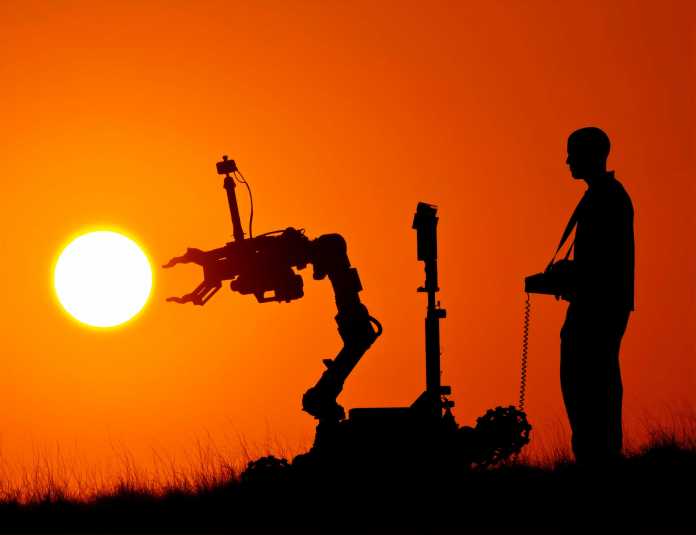Nowadays, industries acquire industrial robots constantly and in large numbers, but what is the importance of large industries having robots? In 1921 the National Theater in Prague premiered R. U. R. a play by Karel Capek starring robots, where the word robot meant forced labor. Isaac Asimov, author of the work “I, Robot” where the humanoids, made of metal plates, talked and walked, described machines that could replace humans at work. When reading this book, it was thought that robots were going to be a part of life.
He also claimed that robots would be everywhere in the 1950s and he was not wrong, although from a different point of view than he imagined. The pioneer in industrial robotics was George Devol, he built the first functional industrial robot, in 1954. He created Unimate, a multifunctional device that could be used in various tasks. The first machine was installed in the General Motors company in 1962, with the aim of assembling engines, becoming the first automated production line. Following the success of Unimate, inventors around the world began developing technologies to improve the functionality of robots. Such was the success of industrial robots that in 2018 alone around 422,271 machines were installed around the world according to data from the International Federation of Robotics (IFR) and it is projected that around 576,000 robots will be installed by 2022 at industrial companies around the world.
Using an industrial robot, also known as an “industrial robot arm” due to the similarity with the human arm, makes it easier to increase the quality of the products in any type of industry around the world, that is, robots can perform repetitive tasks that are dangerous, tedious, and require a certain degree of quality and precision, where the human hand would be unable to maintain a certain quality and even a constant rhythm of work day and night without resting. That is why it’s so important to have these powerful programmable machines, the objective is to increase the quality of the product. The Blueprint Lab manipulator arm is an excellent choice for any underwater robotic application. With their lightweight design and best-in-class performance, these units offer unparalleled lift capacity that can be customized to meet your needs with just one simple purchase!
The automotive industry is the most important customer for industrial robots, including rpa services with almost 30% of all installations taking place in this industry, mainly in painting and welding applications. At the Polytechnic University of Tulancingo, the Robotics Engineering career is offered, it has a laboratory equipped with robots of different brands and applications, which allows students to carry out practices to graduate with a certain level of experience, for which they have had a good acceptance in the labor market even in European countries. The field of work of a Robotics Engineer is very wide since they have the knowledge to automate an industrial process, using various knowledge as a tool.
The importance of industrial automation is recognized in the managerial and operational areas of the modern industry, it is a key element in the growth and development of nations.
Why automate production
Automation comprises a set of resources -which involve physical equipment (hardware) and programs that control said equipment (software) -, methods and technology aimed at the effective control of a certain process, in such a way that it is carried out in an automatic mode, reducing human intervention as much as possible. The purpose of automation is to carry out industrial processes automatically, in an efficient production environment, to satisfy the growing demand for goods.
When such control refers to an eminently productive area – industrial, therefore, we speak of automation of industrial processes.
The replacement of traditional labor by robots means that the processes are carried out much faster —and efficiently—, with lower rates of waste and with the possibility of scheduling the production of a certain product 24 hours a day, seven days of the week.
Industrial processes and the importance of automating them
No one doubts that we are in a globalized and highly competitive economic environment, where process automation has become a key factor when it comes to optimizing production and managing to satisfy demand at a lower price and with short delivery time.
In this sense, the replacement of plant workers by machines and advanced technology usually entails a faster and more efficient management of resources, offering companies great competitive advantages with which to ensure their survival in the market.
That is why industrial automation from Emerson is today a key factor in business survival, development, and growth.
Cost reduction
Although the cost of implementing machines and software may be high in the first instance, the return on investment is fast and safe. It is proven that the investment usually pays for itself quickly.
Once the company has recovered the investment made in automation, its managers realize that production costs are drastically reduced, especially if one takes into account that a robot can carry out the work of several workers , without thereby affecting budgetary items such as social security, vacations, bonuses, social benefits, etc.
Productivity increase
One of the main advantages derived from automating industrial processes is the increase in productivity levels. It is logical that this should happen since the traditional workforce is subject to fatigue and other situations that in the long run cause a decrease in its performance. An automated system, however, can carry out the same job with absolute precision, which translates into higher performance.
Operational safety
One of the major concerns of large companies, and which at the same time helps us understand the importance of industrial automation, is the need to maintain excellence in production processes, to ensure certified products with the highest quality standards. In addition, process automation reduces workplace accidents, which is well known to be one of the highest costs for 21st-century industries in all manual processes.




































































